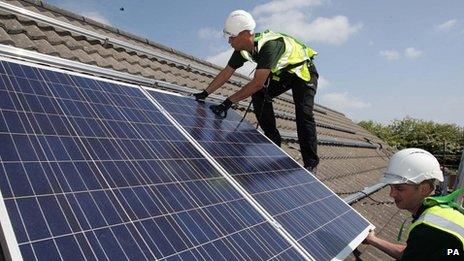Energy efficiency and renewable energy subsidies
- Published

The government wants to encourage everyone to think about how they can pay less on fuel - a pretty sensible idea when energy bills are rising and fuel poverty is on the increase.
It also wants to reduce the UK's carbon emissions to help it meet stringent and legally-binding climate change targets.
One way it is looking to achieve both these aims is by offering incentives for people to become more efficient in the way they use energy, and by encouraging them to start generating their own.
There are three main subsidies on offer.
Renewable Heat Premium Repayment
Under the Renewable Heat Premium Repayment (RHPR), anyone living in England, Scotland or Wales can claim a voucher to help pay for renewable energy generation in their home:
Solar panels to heat water - £300
Air source heat pump, which extracts heat from the outside air - £850
Ground source heat pump, which extracts heat from the ground - £1,250
Biomass boiler, which burns wood to provide heat and/or hot water - £950.
Every household is allowed to apply for one voucher per technology.
Bear in mind that all these technologies must be properly certified, as must the contractor that installs them.
The scheme runs until the end of March next year.
Anyone can apply for solar panel funding, and if you do not use gas as your main heating fuel, you can apply for air and ground source pumps and biomass boilers.
So far, the scheme, which began at the beginning of August, has issued almost £2m worth of vouchers. It will be reviewed at £10m.
The Energy Savings Trust (EST), which is a charity offering advice on how best to take advantage of the subsidies on offer, is managing the scheme and can be contacted on 0800 512 012.
The RHPR was designed as an interim measure to keep momentum in the push for energy efficiency, and will be replaced in the autumn of next year with the Renewable Heat Incentive, external.
Feed-in tariffs
These subsidies, also available only in England, Scotland and Wales, mean you get paid for the electricity you generate from renewable sources - both the power that you use and that which you export to the national grid - up to a maximum of five megawatts.
They cover a number of different technologies, including solar panels, wind turbines, anaerobic digestion, combined heat and power and hydroelectricity.
The so-called big six energy suppliers - British Gas, EDF, E.On, nPower, Scottish Power and Scottish and Southern - are required by law to pay you for the energy you generate, but some smaller providers are not. There are 21 registered providers in total., external
Feed-in tariffs are designed to benefit you in three ways:
You will be paid a set amount for each unit of electricity you generate, external, depending on the technology you have installed, and these are set for the full term of the tariff - between 10 and 25 years. Rates are also linked to inflation
You will receive an additional set payment for every unit that you sell back to the national grid, regardless of the technology you are using
Obviously your energy bills will be lower as you will have to buy less electricity from the grid.
Again, all plant and contractors will need to be properly certified for you to qualify for the scheme.
The energy regulator Ofgem recommends contacting the EST as the initial point of contact to register for feed-in tariffs.
Boiler scrappage scheme
This scheme has closed in England and Wales but is still open in Scotland.
Homeowners can receive up to £400 towards the cost of upgrading an old boiler to a more modern, energy-efficient alternative.
As long as you use a certified boiler and installer, you can claim back the money by sending a completed scheme voucher and invoice for the works to the EST.
Grants and discounts
The are numerous other grants and offers available, many of which relate to insulation, which is seen as the most cost-effective way of reducing energy use, especially when you consider that more than 10 million homes in the UK have lofts that are under-insulated.
Some of these are offered on a local authority level, so will vary depending on where you live. The EST has a webpage which highlights relevant offers depending on your postcode, external.
- Published19 October 2011
- Published11 January 2012
- Published28 February 2012